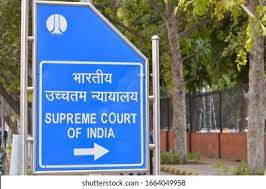Four persons were found in the lorry and upon search, they were found in possession of commercial quantity i.e. 20 kgs of heroin kept in two jute bags. The samples were drawn from each of the packets i.e. 14 big and 12 small polythene packets kept in the two jute bags and they were seized under a seizure memo i.e. Mahazar. All the four persons were arrested after receiving the analyst report that the seized substance was nothing else but heroin. (Para 3)
And convicted them to undergo rigorous imprisonment for 10 years (Para 4)
The High Court vide judgment and order dated 11.10.2022 dismissed the appeal holding that there is no error in the findings recorded by the trial court (Para 5)
The main plank of his argument is that the entire action of seizure and sampling is wholly illegal. It was done in violation of the mandatory provisions of Section 52A (2) of the NDPS Act as the procedure prescribed therein was not followed in drawing the samples and seizing the alleged narcotic substance. Further, there is a serious doubt about the correctness of samples sent for analysis as to whether they were actually the samples of the seized contraband. (Para 8)
A simple reading of the aforesaid provisions, as also stated earlier, reveals that when any contraband/narcotic substance is seized and forwarded to the police or to the officer so mentioned under Section 53, the officer so referred to in sub-section (1) shall prepare its inventory with details and the description of the seized substance like quality, quantity, mode of packing, numbering and identifying marks and then make an application to any Magistrate for the purposes of certifying its correctness and for allowing to draw representative samples of such substances in the presence of the Magistrate and to certify the correctness of the list of samples so drawn. (Para 12)
Notwithstanding the defence set up from the side of the respondent in the instant case, no evidence has been brought on record to the effect that the procedure prescribed under subsections (2), (3) and (4) of Section 52A of the NDPS Act was followed while making the seizure and drawing sample such as preparing the inventory and getting it certified by the Magistrate. No evidence has also been brought on record that the samples were drawn in the presence of the Magistrate and the list of the samples so drawn were certified by the Magistrate. The mere fact that the samples were drawn in the presence of a gazetted officer is not sufficient compliance of the mandate of subsection (2) of Section 52A of the NDPS Act. (Para 13)
There is no material on record to prove that the Magistrate had certified the inventory of the substance seized or of the list of samples so drawn. (Para 14)
In the absence of any material on record to establish that the samples of the seized contraband were drawn in the presence of the Magistrate and that the inventory of the seized contraband was duly certified by the Magistrate, it is apparent that the said seized contraband and the samples drawn therefrom would not be a valid piece of primary evidence in the trial. Once there is no primary evidence available, the trial as a whole stands vitiated. (Para 16)
Accordingly, we are of the opinion that the failure of the concerned authorities to lead primary evidence vitiates the conviction and as such in our opinion, the conviction of the appellant deserves to be set aside. The impugned judgment and order of the High Court as well as the trial court convicting the appellant and sentencing him to rigorous imprisonment of 10 years with fine of Rs.1 lakh and in default of payment of fine to undergo further imprisonment of one year is hereby set aside.
SUPREME COURT OF INDIA
2023 STPL(Web) 344 SC
[2023 INSC 912]
Yusuf @ Asif Vs. State
Criminal Appeal No. 3191 of 2023 [Arising Out Of Slp (Crl.) No. 3010 of 2023]-Decided on 13-10-2023
https://stpllaw.in/wp-content/uploads/2023/10/2023-STPLWeb-344-SC.pdf







